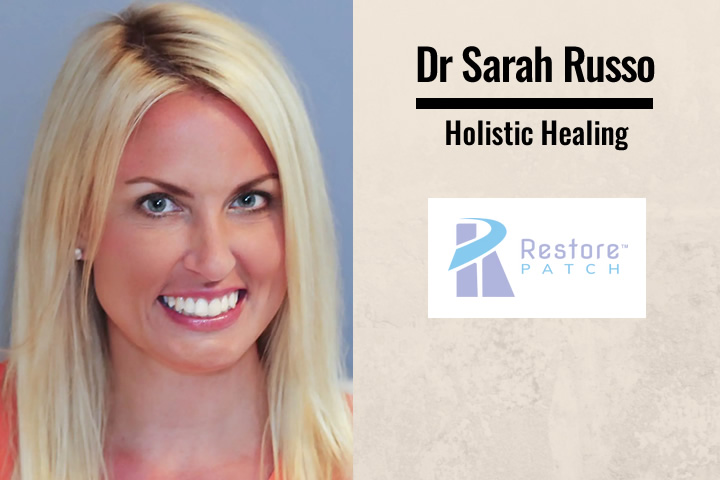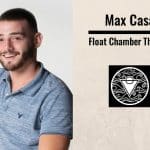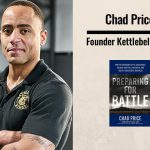Watch the full interview below or listen to the full episode on your iPhone HERE.
Stu: This week I’m excited to welcome Dr. Sarah Russo to the podcast. Dr. Russo is a practicing pharmacist whose personal healing journey instigated her to look beyond the counter for holistic solutions to crippling anxiety. In this episode, we discuss the catalyst behind the rise in mental health issues and look at holistic approaches available to address it. Over to Dr. Russo…
Audio Version
Some questions asked during this episode:
-
What do you think is the catalyst behind the rise in mental health issues?
-
What are the most common causes & symptoms of anxiety?
-
Are antidepressants a viable long-term solution if chronically anxious?
Get more of Dr Sarah Russo:
If you enjoyed this, then we think you’ll enjoy this interview
Amy Clover – Harnessing Fitness And Positive Action To Optimise Mental Health
Dr Brian Brown – How to Beat Burnout & Reclaim Your Health
Brad Davidson – Wake Up, Take Back Your Health & Live Legendary
The views expressed on this podcast are the personal views of the host and guest speakers and not the views of Bega Cheese Limited or 180 Nutrition Pty Ltd. In addition, the views expressed should not be taken or relied upon as medical advice. Listeners should speak to their doctor to obtain medical advice.
Disclaimer: The transcript below has not been proofread and some words may be mis-transcribed.
Full Transcript
Stu
(00:02)
Hey, this is Stu from 180 Nutrition, and welcome to another episode of the Health Sessions. It’s here that we connect with the world’s best experts in health, wellness, and human performance in an attempt to cut through the confusion around what it actually takes to achieve a long-lasting health. Now, I’m sure that’s something that we all strive to have. I certainly do.
(00:22)
Before we get into the show today, you might not know that we make products too. That’s right. We are into Whole Food Nutrition and have a range of super foods and natural supplements to help support your day. If you are curious, want to find out more, just jump over to our website that is 180nutrition.com.au and take a look. Okay, back to the show this week.
(00:45)
I’m excited to welcome Dr. Sarah Russo to the podcast. Dr. Russo is a practicing pharmacist whose personal healing journey instigated her to look beyond the counter for holistic solutions to crippling anxiety. In this episode, we discuss the catalyst behind the rise in mental health issues and look at holistic approaches available to address it. Over to Dr. Russo.
(01:11)
Hey, guys, this is Stu from 180 Nutrition and I am delighted to welcome Dr. Sarah Russo to the podcast. Dr. Russo. How are you?
Dr Russo
(01:20)
Hi. Thanks for having me. Love listening to your accent. This is super fun to be actually over here because I’m from the US.
Stu
(01:28)
Yeah, well, I was going to say apologies for the interruption. Because I know that you guys are on holiday weekend and it’s getting later on in the day, so you probably want to do other things as well just to maximize your holiday today.
Dr Russo
(01:39)
Oh, no. I love talking, so this is fine.
Stu
(01:42)
Brilliant.
Dr Russo
(01:42)
We’ll have dinner after.
Stu
(01:45)
Yeah. Okay. Well, it’s going to take me a while to get over there, so just give me a chance.
Dr Russo
(01:50)
A couple hours.
Stu
(01:51)
Yeah. First up, for all of our listeners there that may not be familiar with you or your work, I’d love it if you could just tell us a little bit about yourself please.
Dr Russo
(02:00)
Okay. I received my doctorate actually in pharmacy at the University of Connecticut here in the States. UConn is a great basketball school. I don’t know if you guys follow that, but oh my god, they’re amazing. It was a lot of fun going to school there.
(02:17)
And so, I became a pharmacist. I worked the retail circuit. Still am because unfortunately that’s where the pay is. But that was not fulfilling my dream. I had created a Sexual Activity Calendar app probably about 2014. And there I ended up, one of the media outlets here called Dirty Water Media picked me up and I had my own show called 101 with Dr. Sarah.
(02:45)
They wanted me to be the next Dr. Ruth, but you just got to roll with the punches. I ended up being the host of all the national shows for five years because we just started getting country music artists and then that went on that route. And then, it’s such a long story.
(03:05)
But anyway, so then COVID happened. Now I have a podcast called Sessions with Sarah. And we have 2 million people tuning in. And I’m super excited because Alimi Ballard, he’s an actor here in the states from Criminals and Queen of the South on Netflix. And he’s going to be my co-host, so I can’t wait for him to get going on that. Sorry, that was so long-winded.
Stu
(03:27)
No, no, I love it. Well, no, absolutely fascinating. And I know that with your pharma background as well, you’ve got a lot to talk to. And so, predominantly for me, I’m super interested in your thoughts around mental health, anxiety and everything that stems from that, whether it be depression, just poor quality of life, crappy sleep, all of the above. And I know that you’ve got some products as well that we’ll talk about a little bit later on in the show.
(03:56)
But first up, mental health. It’s on the rise exponentially. And the people that are affected by mental health are seem to be getting younger and younger and younger as well. And seems strange to me coming from a child from the ’70s where you didn’t have a care in the world. You’re out on your bike in the sunshine, having fun. But nowadays, it seems like youngsters and teens are getting troubled and everything’s spiraling out of control. I just want to probe your brain as to why you think this rise in mental health is coming about.
Dr Russo
(04:31)
Well, I’m a product of the ’80s, late ’70s as well.
Stu
(04:36)
Great times.
Dr Russo
(04:36)
I went outside and I played. And a lot of the mental health crisis, I believe comes from bullying, which is coming from online. Can you imagine having the internet or Facebook back when you were younger? I can’t. It was already bad enough going to school and having to deal with that one bully that was always giving you a hard time, but you could deal with that within the house, within the high school. But now, they can just go online and anyone can pick on these kids.
(05:08)
And on top of that, you have girls and teens that are comparing themselves to these edited over-Photoshopped Instagram photos as well. There’s a lot more to live up to. And since they’re always on devices, it’s not really good for your serotonin and dopamine either. It makes, your dopamine, they want that quick, satisfying sensation of something as well.
(05:32)
And when we went out to play, we were creating and we got sunshine and it was a totally different world. I can’t even imagine being a child in this right now. I think a lot of that depression and anxiety comes from having to deal with everything online.
Stu
(05:49)
Yeah, totally. Well, so I’m a father of three girls.
Dr Russo
(05:55)
Oh, my dad is too. That’s a lot.
Stu
(05:57)
There’s something in the water.
Dr Russo
(05:59)
They have a lot of hormones.
Stu
(06:01)
There’s a hell of a lot of hormones in the house. I’ve got twins at 15 and eldest has just turned 18.
Dr Russo
(06:08)
Oh, wow.
Stu
(06:09)
Yeah, so there’s a huge amount of hormones in the house. They are a product of the digital age. And I’m mindful because of the conversations that I have on the podcast about a lot of the pitfalls that are in front of these girls every single day. And especially the pressure that they have with the need and want to own devices. And when they get together, they’re all these kind of in their little digital cave.
Dr Russo
(06:38)
Right. Yeah.
Stu
(06:40)
I’m interested in perhaps the symptoms of anxiety then. For somebody like me who needs to keep a close eye on daughters because I don’t know whether they’re just going through puberty and hormonal and getting grumpy and all of the like. Or whether that is an offshoot of this digital lifestyle that they’re currently living. Causes symptoms of anxiety, and it doesn’t necessarily have to be teens, it could be everybody, but what are your thoughts on that?
Dr Russo
(07:13)
Anxiety symptoms are when you see somebody recluse back into themselves and just their personality almost changes. If you see anybody’s personality that’s super outgoing or just a total change, more recluse wants to be alone, grumpier than the normal hormone grumpy. Laughing out, screaming and yelling at, not stupid, the weirdest things that make them go out of control, like screaming and yelling, outbursts I would say. If you’re out to dinner with a family and you’re just talking and having a regular conversation and they slam the table and have this huge outburst, there is something going on there.
(07:59)
Personally for me, I had a car accident back in 2019 where somebody hit me from behind. I had no idea it was going to happen. And my car rolled over three times so I suffered a concussion.
Stu
(08:10)
Wow.
Dr Russo
(08:11)
And as you can see, I’m very bubbly. And I could work a 12-hour shift and then go into Boston an hour away from where I was working and be able to do a TV show at 10:00 PM. We did live-streaming before it was cool. Anyway, but for me, after that accident, I became more and more in my head. I was never in my head. I’m on edge about, I worry all the time. Constant worrying, constant worrying of death. That kind of symptoms were something that… Couldn’t sleep very well.
(08:47)
And I’m curious too, to study more people like football players that have concussions because I feel like that does change your personality a little bit. I would say definitely, that was a roundabout way of saying I think it does change people’s personalities.
Stu
(09:01)
Yeah. Yeah, definitely. Well, look, I spoke to a very interesting lady a couple of months ago on traumatic brain injury and I mean it was fascinating. She had a car accident as well, and it totally changed her landscape moving forward. And it was about trying to get back to where she needed to be because it was like night and day. She woke up and she was a different person. And so I can definitely see where you’re coming from. Then for those-
Dr Russo
(09:31)
That’s good to hear for me because I thought it was just me sometimes.
Stu
(09:34)
No, no, crikey.
Dr Russo
(09:35)
Yeah. That’s good to hear. Not good, but you know what I mean.
Stu
(09:38)
Yeah, there’s support out there. Oftentimes, people go to the doctors and I don’t know how this would be treated if you went to just your regular GP, but I would imagine it wouldn’t be uncommon to be prescribed some SSRIs, antidepressants, as a potential solution for long-term chronic anxiousness.
(10:07)
I mean, you’ve got to pharma the background and you’re also in this holistic space where you know that you mentioned sunshine and community and all these other things that could be utilized as an alternative to medication. What are your thoughts on antidepressants?
Dr Russo
(10:22)
Antidepressants are very hard on your body. Think about it in this perspective, you’re taking a pill that’s actually a chemical that’s altering chemicals in your brain, like a serotonin inhibitor, like the Zoloft, they call it Sertraline is one of them. It just alters your whole serotonin to try to make you feel better.
(10:49)
But a lot of the side effects of these medications really do numb your personality and numb the way you feel. A lot of people who I know personally who are on them, I’m not, I would stay away from them because I just feel like it makes you so numb. It messes with your natural chemicals in your body. It’s not for everyone. And one of the biggest side effects with them, the Sertralines and Zolofts is weight gain and a lot of girls end up gaining weight. It does do a lot of different altering to personalities.
(11:20)
Now, with the anxiety medications, you have the benzodiazepines, like your clonazepam, diazepam. Now that’s for anxiety medication. Those are so numbing that they become addicted to that feeling. And a lot of people say they just feel like they’re in a haze, in a cloud and they’re just really, really numb. And on top of that, their personality also changes. They just become more tired, more recluse as well. They get really zombie-like is what I like to refer to because they’re a shell of what they were.
(11:55)
Now, I mean some, I’m not knocking Zoloft or any of those, Paxil or any of those, but I feel like there’s different ways and different pathways that we could take to making you feel better. Because if you had a situation where you broke up with your boyfriend, you’re not having a chemical imbalance. You don’t need to be on something like that. Whereas somebody who might have a more bipolar state would need something like that to help with the chemical reaction going on in the body.
Stu
(12:22)
Yeah. Okay. Let’s talk about then the alternate route. Some of the things that we might be able to call upon, if pills aren’t an option for us and we want to try the “natural way”, where do we go?
Dr Russo
(12:38)
A lot of people have asked this and there’s nothing that are really in the pharmacies here in the US. I don’t know about out there in Australia, but when I was going through all this, one thing I was not going to do was take any of those medications.
(12:52)
A lot of veterans here in the US, they commit suicide, 20 deaths a day. Then you have the leading teens is the second death is suicide. We have all of this mental health crisis going on. We have this product that I’ve been using, I found this online called Restore Patch, and it is so holistic. It is a game changer to the whole drug world. I personally believe this is my statement.
(13:20)
I use the anxiety patches and I have to tell you, when you’re in a state of anxiety, I always say if you’re in Boston, Massachusetts, our traffic is so intense that you just feel like you’re so hyped, you just can’t even calm down. It helps to level you down. It’s a nice… It’s a patch that you put on your body that’s just, it’s really incredible.
Stu
(13:43)
We’ll get into that then in a second, but I’m keen to understand breath work, sunlight, community, grounding, exercise.
Dr Russo
(13:58)
Yoga is definitely perfect for it. That is for sure. Yeah.
Stu
(14:03)
Are those modalities that you would utilize on a daily basis as well to try and balance out whatever might be happening in your world at the moment? Because I know that with smartphones for instance, the tendency is that you’re in this little cave, you’re curled up in the corner looking at the phone. You’re not out on the sunshine, you’re not moving your body. You’re probably not thinking about nourishing food, things like that. Is that-
Dr Russo
(14:29)
That’s true, yeah, because if you have exercise that’s going to increase your serotonin. Say you go for a walk, that’s my favorite thing to do when it’s sunny. It hasn’t been very sunny here, but when it is sunny, I love to go out for a good 30-minute walk because that is going to bring in the vitamin D into your whole universe and then you’re just going to feel automatically better.
(14:50)
A lot of the times, you’re right, a lot of these people aren’t exercising, getting moving. And yoga was also another outlet for me. I love the hot yoga so much. And you just feel incredible and you just feel just so centered when you come out. I know they say that, but you really do. There is different options, like you said, but I think you’re right, exercise is so key to get going.
Stu
(15:12)
Yeah, definitely. And you mentioned that you’ve got a really fast-paced lifestyle. You had the car accident and that triggered some anxiety. But with such a fast-paced calendar, I guess how do you down-regulate yourself? You mentioned that you could go to a TV studio at 10:30 at night. I wouldn’t be able to sleep for hours if I did that because my mind would be racing and I wouldn’t be able to down-regulate that. I need a sleep routine to wind down from the day because I’ve got a lot of stuff going on in my life and a busy household and three crazy teenagers and everything under the sun. What do you do to pull yourself back into this rest and reset state?
Dr Russo
(15:56)
Well, that’s a good point because if you do things all the time, that was really hard. I think with COVID, a small blessing for me happened. I learned how to manage my time better, so I will not do as much stuff during the day. I feel maybe it’s because I’m getting older. I don’t know. I just cannot keep up with that pace anymore. What I do is I make sure if I have to work a full day at a shift, I come home, I walk my dogs, I make some dinner. It’s just very therapeutic, watching TV, go to bed because sleep is also key. But sometimes I can’t stay asleep. But I do try. I do try.
Stu
(16:34)
And what about supplementation? I know that where we are in Australia, things like melatonin prescription only, but I think there’s a little bit more freedom.
Dr Russo
(16:45)
Really?
Stu
(16:45)
Yeah, totally. All of the things that are potentially catalysts for or on the shelf to be able to address any issues in terms of sleep. I mean you guys have things like CBD oil and melatonin. And we don’t over here. It’s not an option. Do you use any of these things? Do you recommend any of these things, especially where I know that anxiety feeds into a mind that is perhaps not in the best state to achieve restful sleep?
Dr Russo
(17:23)
Well, we don’t have very good supplements here either. The only things you’ve mentioned are the melatonin. And then also, we have Benadryl, diphenhydramine. It’s another option, which is actually an antihistamine that people will use to try to go to sleep. But with the antihistamines and the benadryls, over time, if you continually use them, they can actually make you gain weight. That’s when I found that out recently, I was like, I’ll only do that once in a while. And then the melatonin, I’m not surprised. Is it prescribed over there?
Stu
(17:59)
Yes.
Dr Russo
(18:00)
You said you have to have a prescription? I’m not surprised by that because I was like, all right, I want to get off the Benadryl. I don’t want to gain the weight. I tried the melatonin a couple times and it made me feel groggier than I did taking a Benadryl.
(18:16)
I just don’t… For me, it wasn’t a great option. I mean, they’ll say they have other holistics, like Valerian root and licorice and all these things. But you have to be careful with a lot of these supplements because they can interact with medication and also affect the organs. Valerian root, people always don’t realize it can harm your liver and do more harm for you. That’s why it’s hard to find good supplementation for anxiety.
Stu
(18:47)
Yeah, it’s tricky as well. I had an interesting conversation with a breathwork specialist a while back. And he mentioned to me that in order to get back to sleep, and sometimes, let’s say you’ve woken up at 3:00 AM in the morning and your mind is racing.
Dr Russo
(19:05)
Always.
Stu
(19:07)
Like so many of us, myself included. Or maybe you need to go to the toilet during the night and you come back and that elevates your heart rate.
Dr Russo
(19:14)
And you’re like, woo, wide awake.
Stu
(19:17)
Totally. Well, heart rate goes up. And he said, “Well, look, it’s actually almost impossible to fall back to sleep if your heart rate is above 60 beats per minute.” And so in order to try and address that, he said, “Look, just try a little box breathing, where you breathe out for two seconds, hold your breath for two seconds, breathe in for two seconds, hold your breath for two seconds. And repeat in this kind of box nature.”
(19:40)
And it’s actually been a really, really useful tool just to reduce that heart rate and slowly slide back into sleep as well. Do you practice any breath work at all? I know that obviously after the car accident, there is, you’d probably been in a bit of a crazy state with the concussion, which for want of a better word, is a traumatic brain injury. You want to try and address that as best you can. Do you get into that at all, the breath side of things?
Dr Russo
(20:13)
I actually do. It’s funny you say that. That’s what my mom always told me what you said because she used to have these issues and sleeping. But then I learned another one would be you take a deep breath, hold it for seven seconds, and then you do a lion’s breath like that big sigh out. And you do it seven times and that slows down your parasympathetic… I can never say it. Parasympathetic system, your nervous system, you guys. I was being fancy right there. To slow down. If you felt, even if you have a patient or a customer that comes in and just makes your heart race, just do that seven times. And you do calm down. That’s another great way to do it as well.
Stu
(20:56)
Yeah, definitely. Definitely. Well, so I’m keen then to talk a little bit about these Restore Patches that I know that you’re involved in that can be utilized for anxiety, depression, and also sleep, which all of these things are intertwined.
(21:19)
Tell us a little bit about that. I know that we are very mindful now that pharmacological solutions perhaps are not goal state for everybody. Some people are adverse to wanting to take pills. They think, “If I start, I’m not going to be able to stop. I don’t know what the package insert says about side effects and I want to take the natural route.”
(21:41)
The restore patches, so presumably natural. And they do things that we would hope that a natural alternative would be able to do in place of a pill. Is that right?
Dr Russo
(21:54)
Yes. It’s like a little tiny patch I’m going to show you guys. For you guys who can’t see, it’s like a circle sized bandaid. On the flip side, it has a copper foil on it. This is the magic right here. When you pull it off, your anxiety, this is the anxiety patch I’m showing you. You have the copper foil right here and you’re going to place it right behind your neck and you’re going to leave that on for three days.
(22:19)
Now at first I was like, “Is that going to really stay on for three days?” But it does and it’s actually even hard to get off after three days so it’s really good and really sticky, but it has unique frequencies that are put into it. Now, we’re talking about holistic. Let’s talk about natural energy and frequencies. This is how the patch works.
(22:42)
There’s frequencies that are embedded in the copper foil on that little bandaid that I showed you. And it has a natural process of transfer of energy. When you’re feeling really stressed out or really anxious or you’re feeling depressed, the frequencies work together within your body to come together and naturally calm you down.
(23:05)
When you’re in that state of hype, this helps to calm you down. They use copper foils in everything in athletic, like elbow sleeves here. They use them for knees. And they have had such great work and they have really good reviews of healing properties on them as well.
Stu
(23:29)
I’ve heard copper for things like arthritis. Back in the day it was quite common to see a copper band even in the pharmacy, or the chemist as we used to call it in the UK. And you’d wear this band. Similarly for things like seasickness as well. In terms of you said frequency, how does that work? Do you know any more about the science of that? I’m intrigued to understand what that means in terms of copper patch and frequency and what actually, what it’s doing.
Dr Russo
(24:04)
Yeah. When energy is in the body, it’s vibrating. Everything is vibrating. The states become overreactive. When you’re having an anxiety attack or even when you’re on a plane, so you’re on a plane and you get nervous with turbulence, it helps with the frequencies in your body. The copper foil has them embedded into them. They put them in the copper foil. And it just goes right here and transfers all that into your body. And then you have this great… When you’re overreactive, it helps to calm down. If the frequencies are too hyped and too stressed, this helps to bring you down to a natural state.
Stu
(24:43)
That’s anxiety. Restore Patch, what else is on offer in terms of outcomes? I think you mentioned that there was perhaps a sleep patch as well, that this sounds quite unique.
Dr Russo
(24:57)
They have a sleep patch. There’s sleep patches now. There’s a migraine patch that works really well because I do get migraines myself from the accident. I do two at a time, but you can wear different ones at different places. They also have an ADHD one that just came out called Clarity. And that has been doing really well. They did a study with a psychiatrist’s office with the parents’ permission, and they substituted this out for the overly stimulating adderall. And the patients are doing better in school, just having this patch on rather than taking the adderalls.
Stu
(25:34)
Oh, wow. That was clinical study that pitched one against the other?
Dr Russo
(25:39)
Yeah.
Stu
(25:40)
Fascinating.
Dr Russo
(25:40)
Well, it’s in an office and it’s pretty cool that they’re finding this. Sorry about my squiggly wiggly here.
Stu
(25:47)
No, it looks good. That’s the best anxiety patch you’ve ever seen.
Dr Russo
(25:54)
You know what’s so funny? Is there’s actually going to be one coming out for pets too.
Stu
(26:00)
Where does that come from? Because I have heard anxiousness in animals is a real thing. I’ve got friends that have to give their dog the equivalent of Valium.
Dr Russo
(26:14)
And Prozac.
Stu
(26:15)
Yeah. For a dog.
Dr Russo
(26:16)
Yeah. I know, it’s crazy.
Stu
(26:17)
Isn’t it?
Dr Russo
(26:17)
I know. We had a cat on it. The little cat was crazy.
Stu
(26:25)
Let’s just say that I have a migraine and I’m feeling anxious about it. I cannot sleep and I’m on the spectrum with it like ADHD. Am I going to be patched up or is that going to create some kind of crazy reaction with too much electricity going on through these copper patches? Can I wear them all?
Dr Russo
(26:44)
You can wear them all because each patch is uniquely has different frequencies in them, so that’s why there’s a different one. They put in different frequencies into the copper foil. The anxiety one has one for anxiety fields. And then one for sleep has it for sleep fields. The sleep one actually goes on your wrist, which is cool. You have to put it on your wrist. And there’s a little band that goes around it so it stays on because you might thrash around in your sleep. But each one of the patches has a different kind of frequency for each individualized patch.
Stu
(27:18)
Okay. All right. And presumably you can shower. Well, you’d have to be able to shower these things, right? Because…
Dr Russo
(27:25)
Yep, you can. Yeah, it does not come off. I was shocked. Oh.
Stu
(27:32)
Wow.
Dr Russo
(27:33)
Are we yelling? Are we yelling? Sorry.
Stu
(27:40)
If our listeners wanted to find out a little bit more then about these Restore Patches, where could they go?
Dr Russo
(27:46)
They can go to restorepatch.com. But for the podcast, for your listeners, if you guys go to restorepatch.com/podcast, you can get 25% off today. That’s a really good deal. They also have a 60-day money back guarantee. If you’re finding it’s not working for you, which is very, very rarely that happens, you can get your money back. Give it a try for 60 days. And then if it’s not working for you, you just reach back out and let us know and you get your money back. It’s really great that they have that.
Stu
(28:20)
Yeah, absolutely. And are there any caveats or instructions of things that you should do and shouldn’t do to optimize this? I mean, presumably I’m thinking that, look, if I’ve got this anxiety patch on the back of my neck and I’m wanting to become, what, less anxious, calmer, in a better frame of mind, it’s probably not in my best interest to chug a giant can of Red Bull and go to a disco for 12 hours all night or something along those lines. Do we need just to pay attention to any of those things?
Dr Russo
(28:58)
No, because it’s just a copper foil, so it’s not going to do anything. It’s drug-free. It has no side effects. You can have your Red Bull and still wear it.
Stu
(29:11)
Okay. All right. Well, we’re coming up on time. I’m just keen to understand then a little bit about some of the things perhaps that you do each and every day to ensure that you crush your day. In terms of being clear of mind, in the best frame of mind, lots of energy. It may be that you get up in the morning and you like to exercise or you like to drink some fresh water or get some sunlight in your eyes. What types of things do you do to ensure that you’re the very best that you can be on any given day?
Dr Russo
(29:47)
Well, it depends on which day it is. I’m definitely not a morning person. Let’s say if I have the day off, I love to get up, I like to get up at nine o’clock. Though Leo, who you just saw here, doesn’t let me sleep too often anymore.
(30:02)
I take the dogs out, I take them with me in the car and we go and get coffee, all three of us. And it’s just really great start. I hate when something interrupts it. I like to watch a little Hoda & Jenna on the TODAY show. I like to ease into my day. For when I go to work, I’m trying to beat traffic, so I’m not my best self on those days. That’s for sure.
(30:25)
I’m rolling out of bed, having some tea and some cereal, and I got to get the heck out the door. Which is funny that you asked me that because I’m like, I need to start getting up earlier and maybe go for a walk. And maybe my day will be a little bit less chaotic in the morning. I’m just not a morning person, unfortunately.
Stu
(30:44)
Yeah. Well, look, you sound like you’re a night owl.
Dr Russo
(30:46)
Yep.
Stu
(30:49)
Yeah, we’re all different. No, that’s fantastic. Well, look, I’m very, very keen to share this with our audience in terms of the Restore Patches and everything that you’ve spoken about today. What we’ll do is we’ll put all of the links in the show notes. And you mentioned that there was an offer there for our audience as well.
Dr Russo
(31:09)
Of course.
Stu
(31:09)
But Dr. Russo, it’s been a pleasure speaking with you.
Dr Russo
(31:14)
It’s been so nice to talk to you [inaudible 00:31:16].
Stu
(31:15)
Yeah, I look forward to speaking to you in the future.
Dr Russo
(31:17)
Oh, great. Thank you. Have a good morning.
Stu
(31:21)
Yes, you too. Thank you. Bye-bye.
Dr Russo
(31:23)
All right. Bye.







